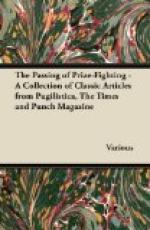I am not convinced that Mr. MAUGHAM’S experiment has succeeded.
T.
* * * * *
“Mr. ——
maintained that it was extraordinuary that if he was
only
slightly dead deceased did
not hear the lorry.”—Local Paper.
Most extraordinuary.
* * * * *
[Illustration: Generous Stranger. “WILL YOU HAVE ANOTHER PINT? (No answer.) I SAY—WILL YOU HAVE ANOTHER PINT?”
Hodge. “DON’T ’EE ASK ZILLY QUESTIONS. ORDER IT.”]
* * * * *
THE MYSTERY.
George and I are two ordinary people. He studies the Weather Reports every day; I do occasionally. He thinks he understands meteorology; I don’t. But lately I felt that I must have some explanation of the weather, so I asked George to explain it.
He said, “Certainly; it’s quite simple. Take wind. Wind is caused by differences of pressure.”
“What is pressure? Who is pressing what?”
“Pressure is what the barometer tells you—not the thermometer; you must keep the thermometer out of this. Suppose it is very hot in London—”
“Don’t be ridiculous.”
“Well, suppose it is very hot at a place A—”
“I thought we were keeping the thermometer out of this.”
“It comes in indirectly. But don’t keep interrupting. If it is very hot at the place A, the air at A rises. You see?”
“No.”
“Obviously it does. If you light a candle—”
“Yes, yes, I do see that. Don’t begin about candles.”
“Well, the result of that is that there is less pressure at A. In other words, there is more room for the air to move about. When that happens the air at the place B—”
“Where is that?”
“Oh anywhere. I told you to think of two places, A and B.”
“No, you told me to think of a place A, and I am still thinking of it, because it is very hot there.”
“Well, this is another place, where the pressure is simply frightful. When the air rises at A the air from B rushes over to A to fill up the gap, and that is what we call wind.”
“I see.”
“No, you don’t. It isn’t quite so simple as that. Now, the atoms of air rushing from B to A don’t go straight there, but they travel in—in sort of circles.”
“Why do they do that?”
“Well, the fact is that these atoms are so keen to get over to A, where there is plenty of room, that they jostle each other, and that makes them go round and round. If they go round and round against the clock, like that, they are called cyclones, or depressions, or low-pressure systems. If they go with the clock, like that, it is an anti-cyclone.”
“Oh!”
“What do you mean—’Oh’?”
“What I said; but go on.”




